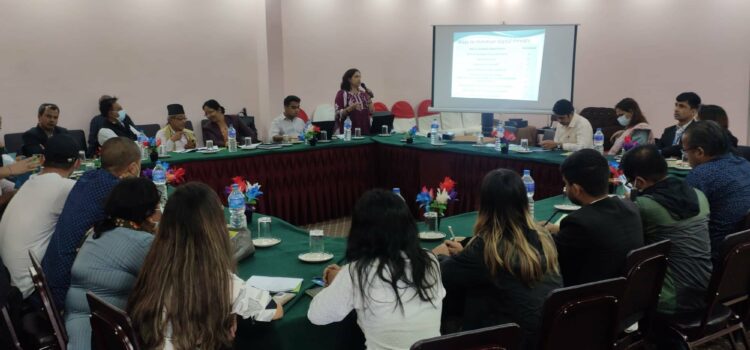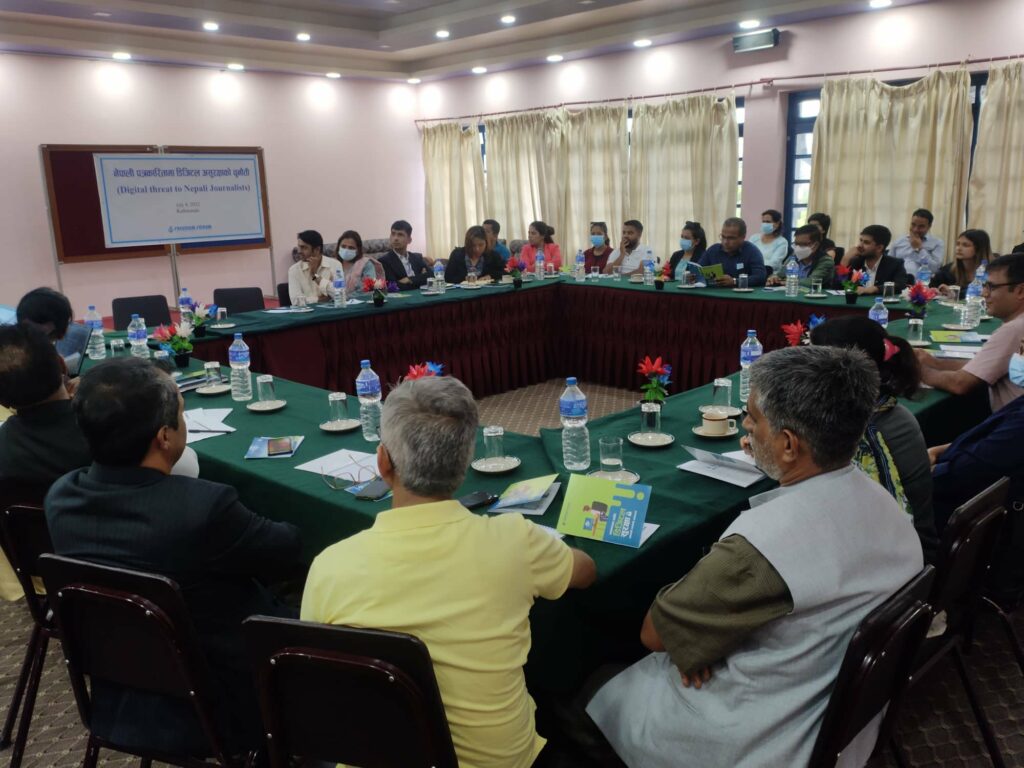Freedom Forum conducted a multi-stakeholder discussion on Digital threat to Nepali Journalists in Kathmandu on July 8. The discussion was organized to discuss upon various threats and challenges media and journalists face while working in online space.
The program supported by International Freedom of Expression Exchange (IFEX) network gathered 43 participants (20 female) including representatives from National Women’s Commission (NWC), National Human Rights Commission (NHRC), Nepal police, Press Council Nepal (PCN), Federation of Nepali Journalists (FNJ), academia, media, civil society organizations, and researchers and law professionals.
Starting the program, media monitoring officer Narayan Ghimire greeted the participants and highlighted the objective of program.
Thereafter, researchers Nanu Maiya Khadka and Suraj Ray presented findings of a survey report- Urgency of digital safety to nepali journalist. The survey was done among 100 journalists around Nepal. The report states that among every ten journalists, seven have faced some form of harassment online. Female journalists are more vulnerable to sexual harassment on digital spaces.
The researchers also pointed out that no action was taken in most of the cases related to digital threat in the report which is an important factor fuel crime and increase self-censorship. FF’s recently published toolkit on digital safety for journalists was also distributed among the participants.
Opening the discussion session, Chairperson at National News Agency Dharmendra Jha said that threats on digital device and digital platforms are different. Journalists are more unsafe in digital platforms. These days new mode of journalism- mobile journalism has evolved in addition to digital media but majority journalists specially at local levels lack digital literacy. The news media has also been discredited time to time hence, along with digital threats to journalists’ threats to media as a whole should also be discussed, Jha underscored.
Asserting to the statement of Jha as media being discredited amid digital threat, senior researcher Harsha Man Maharjan notified about audience’s role in media accountability. He added that the journalists should be aware why, how and for what deed they are facing threat.
Editor at an online news portal Shiva Satyal shared his experience of facing lawsuit for publishing a news on his online portal. He also said that the problem is not about media credibility, major problem lies in dual accountability from audience.
Following this, Chairperson at Media Action Nepal Laxman Datt Pant defined digital threat in two ways- technology induced and technology controlled. Journalists have been facing digital threat due to lack of digital literacy. He also added to the report’s finding as women are more prone to sexual harassment online but they are reluctant towards adopting legal measures. He also suggested that good coordination among media, civil society and state is important to address this issue.
Program coordinator at Body and Data Kabita Bahing recommended the researchers to dive deeper into the intensity, types of threats and focus more on security discussions such as digital security, physical security, psychosocial security and financial security.
Jeevan Bhandari, Chairperson at Online TV Journalists Association Nepal, said that online journalism by its nature of rapid spread bring more threats to journalists. The regulating authority should be more alert and play its role effectively.
Editor at Image Channel Rajan Kuikel stressed that while threats on the digital space are transboundary issues, media and journalists should be made capable to tackle the challenges.
Lawyer Dipesh Dhakal added that due diligence of law enforcing authority is important and journalists themselves should understand their limitation on free speech and right to privacy.
Senior journalist and columnist at Rising Nepal national daily Namrata Sharma mentioned that investigative journalists are the most targeted in both print and online media. Thus, we journalists should also be alert and adopt preventive measures to counter those threats as mentioned in the toolkit distributed today, she underscored.
Chairperson at Media Advocacy Group Anita Bindu also stressed on the need to use the toolkit for self-protection of journalists. Media house should also be responsible for journalists’ online and offline safety. She also called upon media houses, government and civil society actors to collaborate for journalists’ safety.
Similarly, former chairperson at Working Women Journalists Amika Rajthala noted that digital medium has added threats for journalists to the preexisting newsrooms threats and challenges.
Superintendent of Nepal Police Ranju Sigdel urged the media organizations to enhance capacity of journalists and suggested the journalists to collect evidence and inform the police for investigation.
Policy advisor at FF, Krishna Sapkota recommended media houses to develop a comprehensive safety strategy for journalists and regularly monitor its implementation.
Chief Administration Officer at Press Council Nepal, Jhabindra Bhusal admitted that the report has brought the findings similar to PCN’s experience. Talking about the pending Information Technology bill, Bhusal reminded that no laws and policies should be formulated curtailing press freedom and free expression and a convergent mechanism should be built including PCN, FNJ, Nepal Telecommunication Authority and civil society leaders.
Representative from NHRC, informed that the commission has lobbied to draft human rights defender bill urging the state to guarantee safety and security of every citizen. The commission also has freedom of expression committee in place. He also asked the affected journalists to inform the commission about any violation incident.
Chief guest at the program, Chairperson at National Women’s Commission Kamala Parajuli said that though development of technology has both threats and opportunities, digital threat has been a serious challenge these days. Women are more vulnerable and face more challenges due to their gender. After the COVID 19 pandemic which has caused rapid digitization more women have been victimized. Not only journalists’ general citizens should also be capacitated with digital literacy and digital safety, she stressed.
Concluding the program, Chairperson Hari Binod Adhikari stated that FF is always committed towards journalists’ safety online and offline. Media houses should also advocate for journalists safety and impede self-censorship, he marked.


